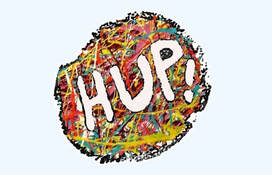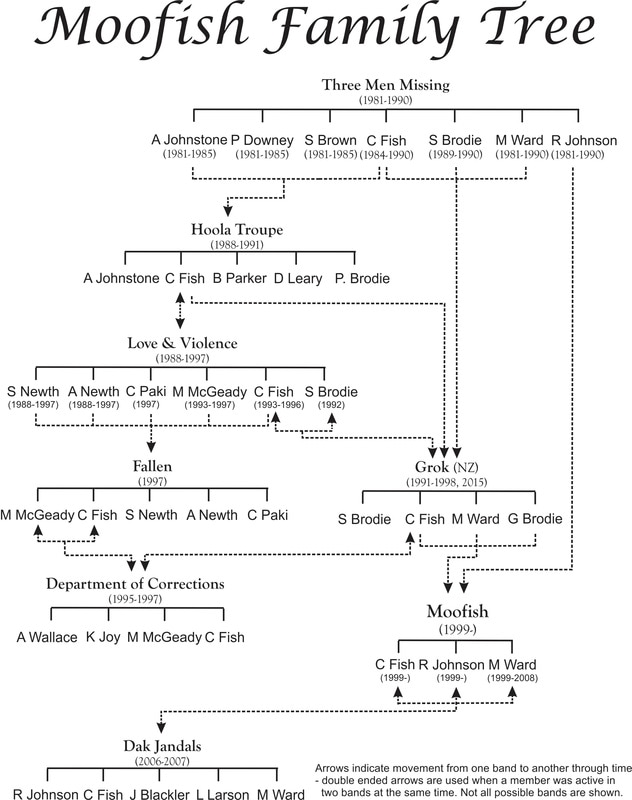|
I N T E R V I E W Chris Johnson of Moofish (and ex- of Grok, Love & Violence, Department of Corrections….) by Ian Duggan Chris Johnson (a.k.a. Chris Fish) has been part of the Hamilton music scene since the late ‘80s, despite for the most part not living in Hamilton. He has gone from the pop of Three Men Missing and the hard rock of Hoola Troupe, through the synth-driven Love and Violence, Grok and Department of Corrections, to the ‘acoustic hypnotic folk’ of Moofish; a band he has been part of with his wife Rhonda Johnson since 1998. Moofish have been releasing a few videos recently, so HUP felt it was a good time to catch up with Chris about his genre hopping, Moofish's international attention, and their recent activity. HUP: Chris, you have done a lot of genre hopping through time. Do you have a broad appreciation of music, or is this progression is simply part of the aging process? Chris: I came from West Australia in ‘84 after hearing New Zealand music — early Flying Nun — and thought I had better come see what the fuss was. I formed a punk band in Tauranga called 'Some Social Deviants', and moved to Hamilton in 1986 after releasing an EP, ‘Snearing a Pig’. It got too rock ‘n’ roll and disintegrated. We gigged a lot, believe or not, with [country music singer] Richie Pickett; he loved punks. The singer’s dad drummed for Pickett. We’ve always jumped genres, I think because we have never paid attention to genres, which most likely comes from the appreciation of music. Our latest Moofish project has jumped from ‘acoustic hypnotic folk’ to….? We had all intentions of releasing a collection of our hypnotic folk songs that we wrote from our eight years in Canada, even going to far as to video them so we would remember them when it came to recording them. We recorded an album worth, but by that time I was ready to push it somewhere else. In June this year we began writing with piano as the main melody, and also with electric and acoustic guitars and bass, and experimenting with sawn off capos, a trick I learned while in Canada. The resulting mix is quite surprising. Not exactly ‘acoustic hypnotic folk’, oops! Sawn off capos are interesting, to say the least. It opens a world of new soundscapes. I’ve been sending Mark Tupuhi our new songs. This guy is awesome; his multi-talented background made perfect sense. I met him in the Schrödinger's Cat days. He can play anything, and his talent sits in well with our discordia, set against Rhonda’s vocals and harmonies. I tell you, it’s heaven for me, and hell for someone trying to figure out the score. He simply nails it. Rhonda is amazing to write with; her sense of melody and originality keeps a balance between wandering off into chaotic discordia to beautiful in between quiet spaces. HUP: Soon after you started Moofish in 1998, you released a self-titled album in the USA, which entered the CMJ (College Music Journal) College Radio Charts. How did that achievement come about? So, before Moofish we were called Beat Angels; Max [Ward], Rhonda and myself. We recorded a few songs in the Rock 93 FM days up at the studio. After that we moved to Otorohanga for a while, and we decided that we would record an album. I approached the local council for some arts funding, and they gave us $1000 towards it, so I rushed out and bought a decent sound card from Germany for my PC. We recorded it at the farm house, and then took it to [studio engineer] Zed Brookes, who kindly layered all the bass tracks and also mixed and mastered it. At the start I had the idea it might be fun to find a publicist who focused on the College scene in the U.S. There was some interest from media arts at Wintec, so we did a presentation on how we recorded and then our marketing in the U.S. I remember Roger Westbury and Midge Marsden were there. I felt nervous; after all, he was a legend. He said, “what the fuck are you doing farming”. We got some traction from the west coast colleges, probably because the students had no idea where New Zealand was. The problem we had was with our band name, ‘Beat Angels’. We received numerous notifications from some other band in the U.S. named Beat Angels at the time, threatening us with vile to change our name, so we did; to Moofish. Those were also the days of MP3.com. You actually got paid. We made a modest amount, enough to cover the publicist and marketing costs. From our publicists we got several placements into advertising, elevators and an obscure indie film. Overall, it was a great experience. Hadn't a clue what we were doing, but it was a lot of fun. We did U.S. radio interviews over the phone, etc. They liked our accent! In fact, they spent a lot time going on about our accent. So ‘Moofish’ came about because we needed a new name to market in the U.S. We performed around the Waikato for a number of years as Moofish; it included Max Ward, Chappy Farrelly, Sooz Brookes, Rhonda and myself. Other versions of Moofish have included Jane Blackler, who plays violin, and bassist Lott Larson. Sometimes we called ourselves ‘Dak Jandels’, a kinda side project. HUP: You have moved from Te Awamutu to Tokoroa, via Ottawa. It looked like you were quite active in Moofish while in Canada. When and why did you return to New Zealand, and what are your aspirations for Moofish back in New Zealand? Chris: Yes, we spent eight years in Canada. Ottawa was our base, but we travelled a lot. Winters are killer, -25°C. Just can’t get used to that. Ottawa is very blues orientated; I love the blues, but I am not a good blues player. However, I did play with the bluesy crew at Irene’s, a very popular bar. Anything from blues, country, blue grass, Americana, etc. You can play somewhere any given night. We did a lot of open mics, and a lot of festivals pass through there. Moofish got a gig at the Ottawa Folk Festival. Unfortunately, Rhonda ripped both her shoulder tendons ice skating and returned to New Zealand for surgery. It became clear we yearned to be back home end of 2014. I had spent eight years working with eight Cuban professors and a few Canadians on a project working in the indigenous reservation system. I got despondent with the state of education and the obvious lack of government willingness to help those who needed it most. On a lighter note, jamming at pow wow is life changing. HUP: It was fantastic seeing Grok playing in Hamilton again last year, a band you were part of - and won the Contact 89FM Battle of the Bands with - in the mid-1990s. With Moofish being acoustic, I understand it was the first time you picked up an electric guitar in a number of years! Unfortunately, however, you injured yourself, and then Grok's front-person Scott Brodie moved back to England. How did you find that experience, and are you sad it came to a premature end?
Chris: Yeah GROK; such an adventure with these guys. You never know where it’s going. Love them to bits, and it was sad to see him off again. Yeah, I injured my hand last September 2015, ripped the tendons. Just starting to come right a year later, so we had to improvise with some electrical tape. Unfortunately it has limited my guitar playing for some time. We have loads of material from the Southern Hemisphere Grok, and he has an equal amount from the Northern Hemisphere Grok. Time and timing is the issue I guess. I am sure our paths will cross in the future. Scott lent me an electric – it was a long time since I had touched one. So now I have bought a 1980 Ibanez electric, all original, and it growls wonderfully. Thanks Scott! HUP: Many people know you better as Chris Fish than Chris Johnson. When and why did you start calling yourself Chris Fish? Chris: Chris Fish, ha! Comes from the young man days. It kinda stuck, I guess... to be honest I can't remember. Suffice to say it's a best kept secret that not even my wife knows. Does that mean I'll get into trouble? Lol!
0 Comments
Leave a Reply. |
Archives
July 2022
Categories |


 RSS Feed
RSS Feed
